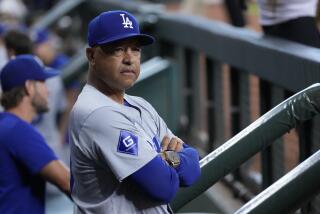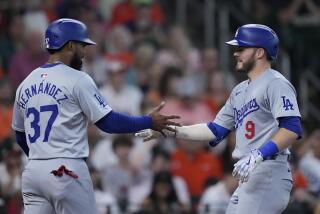Trade Looks Like a Real Dodger Dog
- Share via
PHILADELPHIA — If there were misevaluations and missed opportunities in the off-season and first half, Dan Evans couldn’t be expected to compensate for them on the day of the non-waiver trade deadline -- and he didn’t. In fact, it may be possible the Angels did better by doing nothing.
Having lost Aaron Boone to the New York Yankees (who are next expected to buy Portugal in their ongoing game of one-upmanship with the Boston Red Sox), the Dodger general manager addressed his junkyard offense by trading for the disposable Robin Ventura, who lost his job when the Yankees acquired Boone.
For the record, Evans didn’t even charge the Yankees a collection fee.
He will pay the remaining $1.5 million or so of Ventura’s contract, which is a large chunk of what he had to work with as the Dodgers continue to use the $117-million luxury tax threshold as a self-imposed cap despite the fact that they are still alive in the wild-card race.
Oh, well.
Maybe Ventura’s fading bat speed -- he hit .202 in June with one home run and .231 in July with none -- will suddenly match the ferocity of the head-shaking in the Dodger clubhouse as news of the acquisition spread.
Is all of this too harsh?
Perhaps.
A limited number of bona fide hitters were on the market, and Evans is still handcuffed by immovable contracts, inflexible finances and a recovering farm system that is still not ready to kick out major league-ready prospects.
In the Boone talks, according to a source, the Cincinnati Reds asked Evans for $1 million and any one of four young pitchers.
The Dodgers satisfied both requests, according to the source, but the Reds elected to take the $1 million in Yankee dollars, plus their top pitching prospect, Brandon Claussen.
“What separated the Yankees from everybody else was the readiness of their pitcher [to pitch in the big leagues],” Evans said.
“Realistically, our system isn’t there yet. We’ve been very public about that.”
Evans, of course, can’t be held accountable for the system’s deterioration under the previous ownership.
He can be held accountable for the composition of an offense that many think wasn’t adequately addressed during the off-season nor administered to during a first half in which pitching alone kept the Dodgers in contention.
Ultimately, Evans was left to scramble.
Rickey Henderson and Jeromy Burnitz were acquired in mid-July but have failed to make an impact on an offense ranked last in the majors in virtually every category.
Boone, at 30, represented considerably more -- a right-handed hitter with power to balance the lineup’s left-handed dominance, a future cornerstone.
Instead, outmanned or outmaneuvered, Evans ended up with a 36-year-old left-handed hitter in the twilight of a distinguished career that began when he and Evans were with the Chicago White Sox.
If Evans was living in the past, he at least didn’t have to give up much to return to it.
Neither Bubba Crosby nor Scott Proctor figured in the Dodgers’ future.
Nor, however, does Ventura, possibly in his last year and now joining a team possibly on its last legs after a 7-3 loss to Philadelphia that left it six games behind the wild-card leading Phillies and 1-5 on a nine-game trip many Dodgers thought was make-or-break.
“We still feel we have the personnel to win the wild card,” Evans said. “The fact we were a buyer and not a seller today underscores that, but we can’t keep relying on our pitching.”
The deadline was expected to generate a rash of buyers and sellers, but it didn’t materialize.
Contract complexities and the unusually large number of teams involved in the wild-card races were two factors cited by general managers.
In addition, the Montreal Expos are believed to have taken Vladimir Guerrero, Javier Vazquez and Jose Vidro off the market on instruction from Commissioner Bud Selig, intent on avoiding any perception that he would permit the financial breakup of a team under his custodial care and which still faces a homeless future. The coveted Guerrero, of course, is one of several Expos eligible for free agency at the end of the season and Selig, at some point, will have to address a situation that smacks of conflict.
In the meantime, the deadline market also assumed what Yankee General Manager Brian Cashman said was an “entirely different complexion” when the Reds, who took 32 retread pitchers to camp last spring, fired Manager Bob Boone and General Manager Jim Bowden and began unloading salaries with a goal of getting young pitchers and cash in return. In the four days since the firings, the Reds have traded Scott Williamson, Jose Guillen, Gabe White and Boone, with the same return for each.
“The theme is pitching, pitching, pitching,” said Leland Maddox, filling in for Bowden.
Now, players can be traded only after clearing waivers, but Philadelphia General Manager Ed Wade said that may not be as difficult as in the past, when clubs often put in claims simply to block a competitor from getting the player.
“I think a lot of guys will get through waivers,” Wade said. “I think there will be more chances than there have been in recent years because fewer teams will put in claims, not because they don’t like the players, but because they don’t want to take salary.”
Wade also said he agreed with the many general managers who think the deadline should be moved to Aug. 31.
“The deadline was set when there were two divisions and two leagues,” he said. “Now there are three divisions and a wild card. I don’t think it’s right to force teams to make a decision on whether they’re in or out [of the race] when only two-thirds of the season has been played.”
The deadline is the deadline, and Dan Evans responded to it on a day when the acquisition of 14-game winner Sidney Ponson by the division rival San Francisco Giants compounded the sullen atmosphere in the Dodger clubhouse.
Evans, of course, insisted he wasn’t trading just to be trading, but compared with Aaron Boone, Robin Ventura certainly had that look.
More to Read
Are you a true-blue fan?
Get our Dodgers Dugout newsletter for insights, news and much more.
You may occasionally receive promotional content from the Los Angeles Times.








